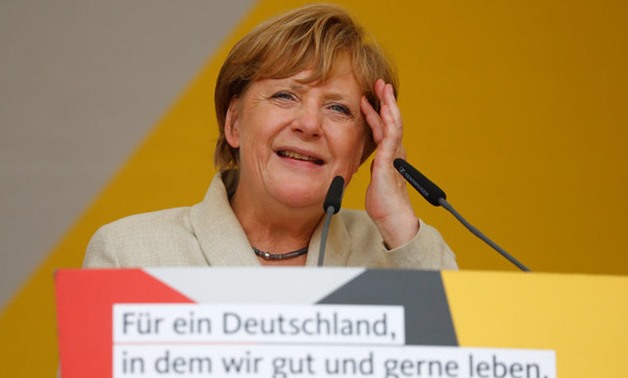
German Chancellor Angela Merkel, a top candidate of the Christian Democratic Union Party (CDU) for the upcoming general elections - REUTERS
Berlin - 19 Sep 2017:Syrian student Moataz Ghannam believes many Germans misunderstood Chancellor Angela Merkel when she delivered her now-famous rallying cry at the height of the refugee influx, "We can do it".
"I didn't see it as a statement of fact -- 'we can do it right now' -- but as a goal: we all need to work together, refugees and Germans," the 27-year-old said.
Ghannam's odyssey from his war-ravaged homeland to Europe's top economy represents an unqualified success story -- so much so that he was recently invited to sit on a panel with Merkel to measure progress over the last two years.
This autumn, he will begin working toward finishing his bachelor's degree in business administration at a private university in the German capital, using credits he earned in Syria and through the Berlin-based, non-profit Kiron.
Kiron Open Higher Education, which supports 2,700 foreign students, more than 40 percent of whom are Syrian, was one of a handful of examples of "We can do it" projects Merkel personally visited ahead of the September 24 general election.
In fluent German, Ghannam told AFP he knew Merkel's confident assessment of the country's ability to take in the newcomers had forced many people to confront their fears of the unknown.
"Germany is a land of opportunities but you have to make an effort -- you can't sit at home or expect something from the unemployment office," he said.
About 200,000 of the more than one million refugees who have arrived since 2015 have found legal employment to date.
But suggestions for how to bring more applicants into the job market have varied wildly, in part based on the pace of expanding integration course offerings.
In late summer 2015, thousands fleeing war and misery streamed into Germany's railway stations each day.
There were cheering crowds bearing teddy bears to greet the new arrivals, and the influx gave birth to a new word, "Willkommenskultur" (welcome culture), appealing to post-war Germany's self-image as a force for good in the world.
But there was also a spreading wave of hostility and chaos, deeply unsettling many Germans, particularly in the depressed former communist east.
Hundreds of arson attacks targeted refugee shelters, angry mobs threatened groups of terrified asylum seekers in rural areas and Merkel's once stellar approval ratings nosedived.
A rash of sexual assaults on New Year's Eve 2015 in Cologne, blamed on North African migrants, and a string of Islamist terror attacks, including a deadly truck attack at a Berlin Christmas market nearly a year later, threatened to wipe out the remaining goodwill.
Commentators began writing Merkel's political obituary.
But just two years on, Merkel, in power since 2005, looks set to sail to a fourth term.
Her luckless challenger, Social Democrat Martin Schulz, broadly supports her stance on migration, which voters cite as a top concern.
The numbers of new arrivals have dwindled due to the closure of the so-called Balkan route for migrants and the signing of a controversial deal with Turkey to stem the influx.
Meanwhile the doomsday scenarios conjured up by many sceptics -- including some of her closest German political allies and US President Donald Trump -- have not come to pass.
Kiron, with 70 employees and around 300 volunteers, calls itself a "digital bridge" to help refugees meet admission requirements for German universities.
Co-founder Markus Kressler said the programme was part of a patchwork of initiatives intended to ensure that the initial momentum behind integration efforts is not lost.
"We don't want to have to rely on that can-do spirit lasting -- you always have it at the beginning of crisis situations and then the political climate changes," he said.
Despite Merkel's lead in the polls, which is around 15 points, the political ground has indeed shifted in the past two years.
The anti-immigration Alternative for Germany (AfD) has poached disaffected supporters from the mainstream parties and entered 13 of Germany's 16 state legislatures.
Although its support has slipped since a peak in late 2016, it is still poised to capture at least 10 percent, giving it a minimum of 60 seats in the Bundestag lower house.
Merkel -- whose centre-right CDU party was hit with back-to-back drubbings in state elections last year -- admitted "mistakes" and retreated from the "we can do it" slogan, acknowledging it had become a lightning rod for naysayers.
But as the mood has brightened, Merkel has returned to her stance that while she was not seeking a repeat of 2015, she had acted in the national interest.
"It was important and right for us to take in these people in an emergency, just as it is right for us to find long-term, sustainable structures (to integrate them)," she told reporters late last month.
"Not euphoric, more pragmatic -- that is the Merkel style," commented public radio the next day.
"Whether the country has done it? That's a matter of perspective. We may only know when Angela Merkel is no longer chancellor."


Comments
Leave a Comment